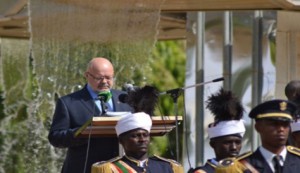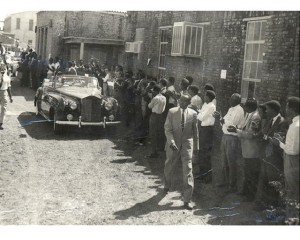14th November 2012
Majesty and Remembrance
The following is a guest post by Deputy Ambassador to Sudan.
One of the perks of stepping into the Ambassador’s shoes when he is away is that I occasionally get to represent the United Kingdom at some really uplifting events.
Last Friday was a case in point.
The Palace Museum had agreed to host an exhibition of photographs and text recording HM The Queen’s Visit here in 1965. This was something we had put together earlier this year to mark Her Majesty’s Diamond Jubilee. The exhibition was to be opened following the changing of the guard ceremony at the Palace.
When I arrived at the entrance to the Palace, just prior to the beginning of the ceremony, I was struck by the number of spectators lining the streets around the Palace and by the warm and friendly holiday atmosphere. I was also amused when told that the outgoing guard were still in their summer white uniforms while the incoming guard were in the blue “winter” uniforms.
What is termed winter in Sudan would count as a very warm summer at home in the UK! The changing of the guard ceremony itself was impeccable, colourful and spot on time.
After opening the exhibition, I was delighted to see so many ordinary members of the public taking the opportunity to walk round the exhibition.
Many came up and told me their personal memories of the visit, even though they were just children at the time. I was particularly delighted to meet Mrs Samia Aboud, daughter of former President Ibrahim Aboud who had visited the UK in a State Visit in 1964.
Amazingly the museum still has the Rolls Royce used by Her Majesty during the visit – and it still works! I would urge those in Khartoum who can to catch the exhibition while they can. We will look for ways to bring it to a wider audience
I was also kindly given a tour of the rest of the Palace Museum by Dr Gibreel Abdellatif Ahmed Under Secretary of the Palace and Mr. Abdelnasser Sirelkatim Hassan, Director of the Palace Museum.
Many of exhibits there remind us of how the history of our countries is intertwined. A history too few of us know enough about.
What particularly impressed me was the exhibition detailing the Sudanese independence movement. I reflected that despite the often turbulent past of our two countries, the Queen was so warmly welcomed here by the Sudanese people just a decade after independence.
It’s a warmth of welcome that I and many of my colleagues continue to experience from the Sudanese people to this day.
That leads me to reflect on another more sombre but moving event: the Remembrance Day Service held at the Commonwealth War Graves Cemetery here in Khartoum this Sunday morning. (The exhibition also features Her Majesty the Queen laying a wreath at the same cemetery back in 1965).
Similar services are held every year across the globe on 11 November to remember all those who have died or been affected by conflict since the end of the First World War.
It was moving to see representatives of countries who fought bitterly against each other many years ago come together today in an act of remembrance. Countries, which were once enemies but now work together to promote peace and stability in other conflict affected areas, including Sudan.
was moving to see representatives of countries who fought bitterly against each other many years ago come together today in an act of remembrance. Countries, which were once enemies but now work together to promote peace and stability in other conflict affected areas, including Sudan.
So the message I take from this weekend is that with the right political will and leadership, reconciliation is always possible.
So that was my brief sojourn into the limelight. The Ambassador, Peter Tibber, is now back and will return to this blog shortly.

till now i do not understand why uk leave sudan without hestoric friend in world.
u k .had chance and big chance to do many thing in sudan ,help,copration,trading ,cutlture, support
its simple just do not follow USA
Thoughtful and sensitively expressed.My uncle fought under British command in the Eastern Sudan and had a great deal of admiration for his comrades in arms. The national movement in our country was politically ahead of its counterparts in Africa and the M East .The leaders acrually addressed the public from Radio Omdurman to mobiolise them for battle against Hitler and allies and for the Allies.
That meant an alliance with the British who were the colonisers!They saw no contradiction between their call for self-determination leading to independence and an alliance with the British because they understood the difference between Nazism and democracy.Their faith in the Atlantic Charter proved right when they achieved independence through a parliamentary vote in 1955.
Although we have had military confrontations during the Condominium ,the Sudan did not suffer anything remotely comparable to what happened in Algeria or Kenya .
Your Excellency,
thank you very much indeed for the inspiring conclusion. I would love to use the historic photographs for our “Picture of the Day”. Are they in the public domain?
Yours Sincerely